| Srl | Item |
| 1 |
ID:
095303
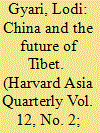

|
|
|
|
|
| Publication |
2009.
|
| Summary/Abstract |
With no concrete agreement reached at the conclusion of the eighth round of the Sino-Tibetan dialogue, the Tibetan movement is now at a crossroads. This essay provides an overview of the Sino-Tibetan negotiations and His Holiness the Dalai Lama's tireless efforts to search for a peaceful solution in the past half century.It is against such a historical backrop that the author argues that the Dalai Lama is the key to solving the Tibetan issue.
|
|
|
|
|
|
|
|
|
|
|
|
|
|
|
|
| 2 |
ID:
095314
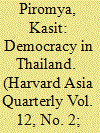

|
|
|
|
|
| Publication |
2009.
|
| Summary/Abstract |
According to Thailand's foreign minister Kasit Piromya, democracy in Thailand is going through some growing pains. It is hardly a struggle between democracy and dictatorship, nor one of the rural masses against the urban elite. Instead, it is one of patronage versus good governance-a struggle between old style patronage politics, ironically being led by former democratically-elected Prime Minister Thaksin Shinawatra, against the growing push for a democratic system guided by the moral compass of inclusiveness, transparency, accountability, good governance and the rule of law.
|
|
|
|
|
|
|
|
|
|
|
|
|
|
|
|
| 3 |
ID:
095316
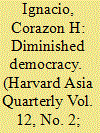

|
|
|
|
|
| Publication |
2009.
|
| Summary/Abstract |
There have been countless assaults to the democracy and democratic institutions that the Philippines has been enjoying over the past 111 years.What has saved the country is the innate attributes of its people.peace loving, resilient, forbearing, and religious. The dark practices of electoral politics and the dirty tentacles of politicians are the latest threats to the country's democracy. Will democracy continue to hold given the erosive and continuous assault on its electoral system, as the country prepares for a national election in May 2010?
|
|
|
|
|
|
|
|
|
|
|
|
|
|
|
|
| 4 |
ID:
095313


|
|
|
|
|
| Publication |
2009.
|
| Summary/Abstract |
Recently, India concluded its fifteenth general elections to the lower house of Parliament. Apart from the sheer scale of this event, India's experiment with democracy has been remarkable on several counts. It has held elections on schedule without a break for six decades-the only developing country to do so. Instead of its diverse population being an impediment to nation building, it has used democratic processes to manage internal conflict and tension. Transfer of power is always peaceful and taken for granted. This article traces the steps India has taken to remain a vibrant democracy and discusses the challenges ahead.
|
|
|
|
|
|
|
|
|
|
|
|
|
|
|
|
| 5 |
ID:
095310
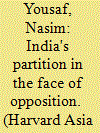

|
|
|
|
|
| Publication |
2009.
|
| Summary/Abstract |
The partition of British India has come to be viewed as inevitable. It is widely believed today that there was no other practical option for the nation of Muslims and Hindus,but to divide the country. Over time, this view has been endorsed by many writers, including those in the West, and indeed become virtually synonymous with a universal truth. A closer re-examination of the fact, however, reveals a complex picture of the partition episode. while the two-nation theory certainly had its share of supporters, what seems to have been overlooked by many is that there was a tremendous amount of opposition to the division of India. Moreover, evidence substantiates that there was an intriguing alliance which was one of the key forces that ultimately led to partition.
|
|
|
|
|
|
|
|
|
|
|
|
|
|
|
|
| 6 |
ID:
095307


|
|
|
|
|
| Publication |
2009.
|
| Summary/Abstract |
While Americans have chosen their new leader and countries around the globe are grappling with the U.S. economic downturn, Japan has been engaged in one of its most dramatic political seasons of recent times. This essay will explain this laboratory of Asian parliamentary democracy. which is taking place in real-time for America's closest Asian ally.
|
|
|
|
|
|
|
|
|
|
|
|
|
|
|
|
| 7 |
ID:
095306
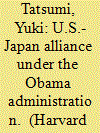

|
|
|
|
|
| Publication |
2009.
|
| Summary/Abstract |
As the Obama administration begins to build its relationship with Japan, both challenges and opportunities confront the U.S.-Japan alliance.While the global economic environment will continue to preoccupy the leadership in Tokyo and Washington for some time, a number of pressing security concerns-U.S. troop withdrawal in Iraq, exploring ways to open dialogue with Iran, and continuing to fight the war on terror in Afghanistan and elsewhere-may siphon attention to Japan away from the Obama aministration.With so much uncertainty ahead, the next few years under President Obama will be a true test of whether the U.S.-Japan alliance can really function as a foundation of peace and prosperity in the Asia-Pacific region.
|
|
|
|
|
|
|
|
|
|
|
|
|
|
|
|